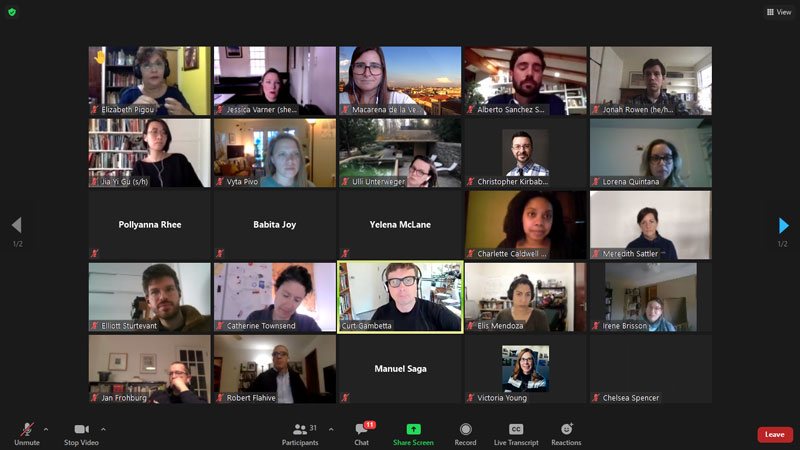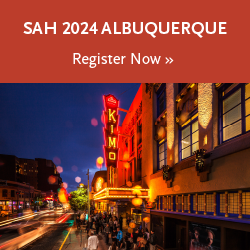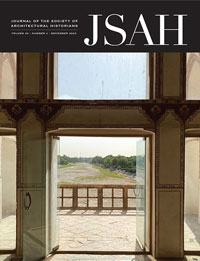-
Membership
Membership
Anyone with an interest in the history of the built environment is welcome to join the Society of Architectural Historians -
Conferences
Conferences
SAH Annual International Conferences bring members together for scholarly exchange and networking -
Publications
Publications
Through print and digital publications, SAH documents the history of the built environment and disseminates scholarship -
Programs
Programs
SAH promotes meaningful engagement with the history of the built environment through its programsMember Programs
-
Jobs & Opportunities
Jobs & Opportunities
SAH provides resources, fellowships, and grants to help further your career and professional life -
Support
Support
We invite you to support the educational mission of SAH by making a gift, becoming a member, or volunteering -
About
About
SAH promotes the study, interpretation, and conservation of the built environment worldwide for the benefit of all
Method Acts: Graduate Students and Emerging Professionals Discuss Approaches to Scholarship

Screen shot of the Method Acts workshop on “Ethnographic and Material Methods”
The COVID pandemic rendered public archives, collections, and libraries inaccessible. Widespread protests for racial justice during the summer of 2020 called for a greater understanding of bias and exclusion, and prompted academics to interrogate their positions and privileges. This combination of circumstances spurred the SAH Graduate Student Advisory Committee (GSAC) team—Jia Yi Gu, Jonah Rowen, and Jessica Varner—to ask: How are early-career scholars of architectural history acknowledging their own place in the histories they are writing? How do these acknowledgements take place, and where? And will this moment mark a shift in scholarship?
Our premise started from understanding historical methods as inherently political practices. The question of who gets to write history is inextricable from the politics of how they write it. These factors of scholarly orientation include: the scope, subject, and mode of address, as well as the evidence that is available at any given moment, and which conditions our encounters with historical events and objects of study.
Additionally, as increasingly varied forms of evidence beyond visual analysis provide the basis for the history that we write, the team asked how our encounters with sources are different in the current moment. In situations in which archives are unavailable, non-existent, or inaccessible, how are scholars continuing to engage with the sources that are available to them without sacrificing depth and details? Barred from travel, how would our field nonetheless retain ambitions toward more global architectural history? As scholars realign research towards engaged, activist, and decolonial methods, we asked how people were using the present moment as an opportunity to shape a more inclusive and interdisciplinary field.
The SAH GSAC members arranged the “Method Acts” conversations along two broad themes, featuring a total of five presenters. For the first, on “Narrative and Documentary Methods,” Charlette Caldwell and Pollyanna Rhee presented their work using Black-owned newspapers, immigrant census surveys, and other popular media to enfold lived experience into architectural history. Shajjad Hossain presented his scholarship using GIS data, which brought up questions of objectivity, subjectivity, location, and the mapping of myths on Indigenous land. For the second event, on “Ethnographic and Material Methods,” Macarena de la Vega presented her interviews with architectural historians in Australia and New Zealand, which foregrounded questions of gender and relations between center and periphery. Alberto Sanchez-Sanchez outlined his project preserving a single centuries-old building in Spain and its transformations over time, as COVID forced him home. The presenters selected short excerpts of other authors’ written materials that encapsulated their approach. These materials were pre-circulated among an audience of graduate students, emerging professionals, and other colleagues. Rather than a typical seminar-style format (with a leader and assigned reading), the workshop format encouraged a horizontally-structured conversation discussing works in progress. Participants described a breadth of approaches and their own projects in relation to those of the presenters.
This series of conversations confronted questions of methodology directly. The group asked how new methods may prompt reconsiderations of content and practice, both familiar and not. The conversation considered how architectural history utilizes and learns from methods and practices common in anthropology, science and technology studies, media archeology, environmental history, translation studies, critical race theory, and feminist, gender, and queer studies, among other fields.
Scholarly practices have been upended over the past year in unexpected, challenging ways. Yet those circumstances led to opportunities as well: a recognition that now is an ideal time to reconsider our approaches at every level. The Method Acts conversations provided a forum for engaging with other scholars who are doing the formative work of remaking the discipline of architectural history during a period of isolation.



Leave a commentOrder by
Newest on top Oldest on top